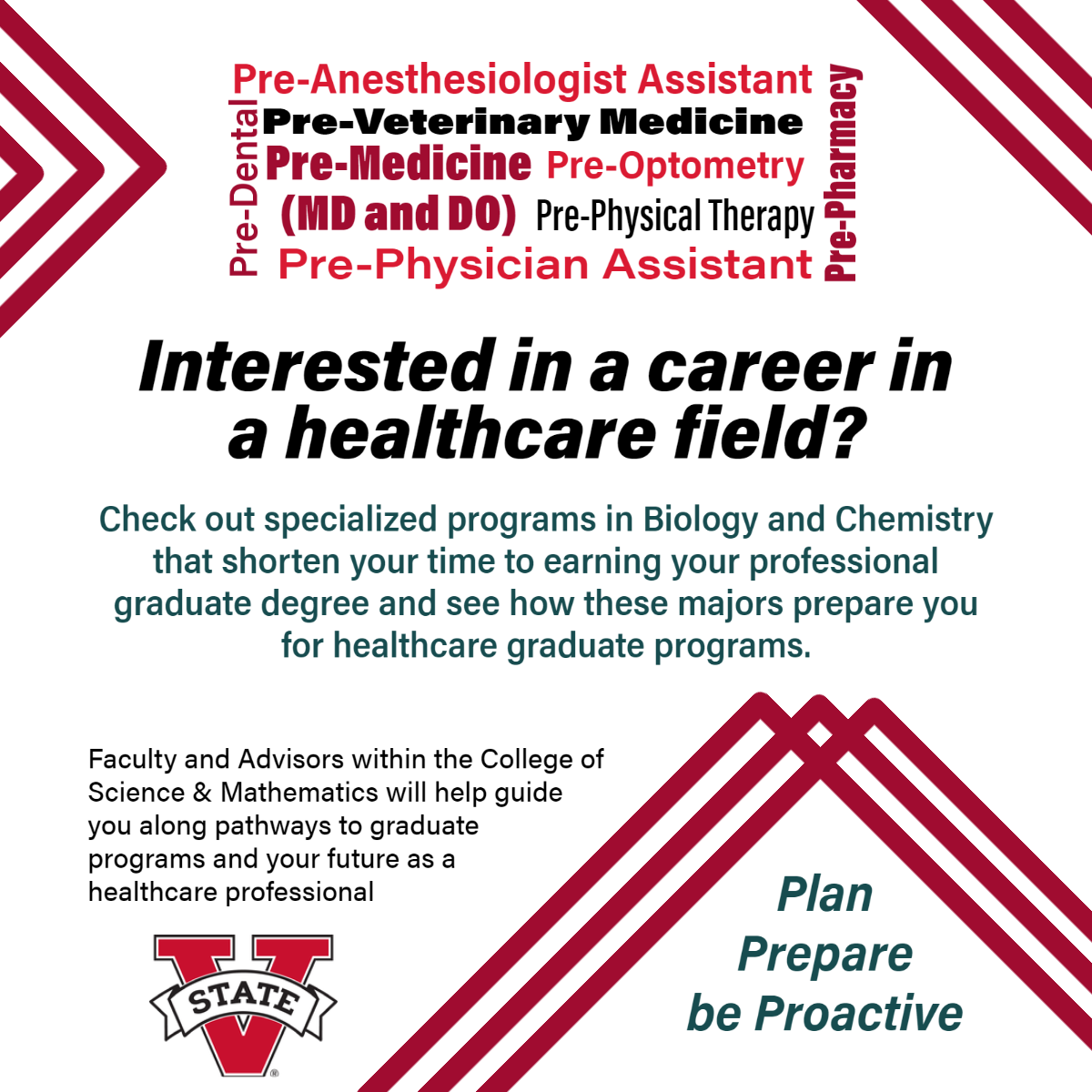Pre-Health Professions Information

Interested in a career in a healthcare field like physical therapy, veterinary medicine or human medicine, but not sure where to begin? Did you know that there are no pre-health majors (e.g., pre-med major, pre-physical therapy major, pre-dental major, etc.) here at VSU or any other university? What does this mean if you are interested in pursuing this career goal?
It means that undergraduate students are not required to major in a particular program in order to prepare for graduate programs in health fields such as medicine, physical therapy, dentistry, veterinary medicine, etc. Instead, a student must satisfy the pre-requisites for that particular professional graduate program, and they can complete these requirements while completing any major they choose. The majority of students who are pursuing a career as a health professional do choose a STEM major like Biology or Chemistry because the pre-requisite courses are requirements in these STEM majors; in addition, doing well in these majors and taking advantage of opportunities in these departments will make you competitive when you apply to graduate programs. But, this is not an absolute requirement. As an undergraduate who wants to go to a graduate program in a health field, you can find your passion in any major, as long as you satisfy the pre-requisites and do the work necessary that will make you competitive for a particular graduate program.
For example, according to the Association of American Medical Colleges (AAMC) in 2021 of the 22,666 students who matriculated into medical school the most common majors were:
- Biological Sciences - 13,158 total matriculants
- Other - 3,374
- Physical Sciences - 2,208
- Social Sciences - 1,974
- Humanities - 849
- Specialized Health Sciences - 942
- Math and Statistics - 161
Applying to professional programs is competitive, and you will need to gain the experience and have the credentials to make you stand out from a field of highly qualified applicants. The factors that are taken into account are:
- GPA (Overall and Science)
- Standardized Test Score (e.g., MCAT, GRE, PCAT)
- Shadowing or Clinical Experience
- Letters of Recommendation
- Research Experience
- Communication Skills
- Commitment to Service (Community Volunteer Activities)
- Leadership Activities and Skills
- Work Experience (Evidence of Organizational Skills and Time Management)
- Study or Work Abroad (Cultural Competence)
Fast-Track Pathways with Partner Institutions
Departments in the College of Science & Mathematics have partnered with various institutions to develop alternative pathways to earning an undergraduate degree AND a professional degree in a shorter amount of time. If you are interested in learning more about these competitive pathways, click on the links below for the individual degree options.
- Osteopathic Medicine (DO)
- Pharmacy (PharmD)
- Lake Erie College of Osteopathic Medicine (LECOM) 3 + 4 (Chemistry Majors)
- Philadelphia College of Osteopathic Medicine (PCOM) 3 + 4 (Chemistry Majors click here)
- South University 3 + 3 (Chemistry and Biology Majors)
- University of Georgia 3 + 4 (Chemistry Majors)
Additional Information for the Following Fields of Study
- Allopathic Medicine (MD)
- Dental (DMD)
- Optometry (DO)
- Osteopathic Medicine (DO)
- Pharmacy (PharmD)
- Physical Therapy (DPT)
- Physician Assistant (PA)
- Public Health (MPH)
- Veterinary Medicine (DVM)
Post-Baccalaureate Programs
College of Science & Mathematics
- 1036 Hugh C. Bailey Science Center
-
Mailing Address
1500 N. Patterson St.
Valdosta, GA 31698 - Phone: 229.333.5699